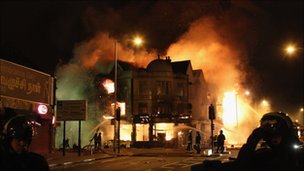 Samuel Maynard Hicks is a skinny and shy-looking youngster, yet his eyes burn with fervour in a face mottled with ash and dust. His fingers are blackened; soot and grime mark out his fingernails as his hands twist a dog-eared copy of “The General Theory of Employment, Interest and Money” by John Maynard Keynes.
Samuel Maynard Hicks is a skinny and shy-looking youngster, yet his eyes burn with fervour in a face mottled with ash and dust. His fingers are blackened; soot and grime mark out his fingernails as his hands twist a dog-eared copy of “The General Theory of Employment, Interest and Money” by John Maynard Keynes.
“It is essential that we stimulate the economy,” he says earnestly. “Keynes believed that, no matter how unproductive an action may appear, if it results in increased aggregate market activity we must do it. We’ve let the government have a go with macroprudential stimulus and quantitative easing, but people just won’t spend. So we’re giving them a reason to start building again by destroying their businesses, burning down their homes and stealing their stuff.”
“It’s quite clear,” says Reginald Graham Sacks, “I’ll quote Keynes: ‘”To dig holes in the ground”, paid for out of savings, will increase, not only employment, but the real national dividend of useful goods and services.’ So if people have a reason to buy things then that demand can improve the overall economy.”
I travelled to Clapham Junction, scenes of some of the rioting that took place over Monday night. A Debenhams department store had been burned, including a floor of apartments above the store. The streets are a mess of broken glass, bits of looted goods dropped behind, twisted metal, burned scraps and even more burned out shops and cars.
Hicks had introduced himself while I had been interviewing a sobbing old woman whose home had been destroyed and invited me to join his “Economic Posse” as they evaluated the events of the night before and planned for Tuesday.
“If the Treasury were to fill old bottles with banknotes, bury them at suitable depths in disused coal mines which are then filled up to the surface with town rubbish, and leave it private enterprise on well-tried principals of laissez-faire to dig the notes up again (the right to do so being obtained, of course, by tendering for leases of the note-bearing territory),there need be no more unemployment and, with the help of the repercussions, the real income of the community, and its capital wealth also, would probably become a good deal greater than it actually is,” reads a stout, pimply youth with shaggy blonde hair and yellowing teeth.
“That’s Krugman Paulson,” says Hicks, “but the problem is that, during a recession, consumers start to hoard their savings; what Krugman calls ‘the desire of individuals to hold liquid monetary assets’. So quantitative easing isn’t sufficient. We need to force people to start spending.”
“We tried simply pirating things off the internet,” says Sacks, “but we just couldn’t download enough free music, movies and porn to make an economic difference.” The others nod, looking mournful.
“We didn’t want to do this but we had no choice. Look at all the work we’re creating. Builders and glaziers are going to do well. Everything we stole or destroyed will have to be replaced. Shops will have to restock. Factories will have to make more stuff to fill those empty shelves.”
Hicks’ face almost glows with riotousness: “We’re rebels for the cause of Keynesian multiplier effects.”
Paulson reads clearly from Keynes: “The social object of skilled investment should be to defeat the dark forces of time and ignorance which envelope our future.”
The others lower their heads in silent communion.
Categories: Economy, Freedom/Privacy, Infrastructure, Politics/Law/Government



this is just plain brilliant.
Somebody’s auditioning for The Onion, looks like.
This is the best thing you’ve ever done. Marvelous and funny and perfect; this is what satire is supposed to be.
I’m with Denny and Ann. This is fucking awesome.
I can’t stop laughing. I’m trying to picture Rand Paul reading this …
I doff my hat to you, sir.
I agree with the comment that this is simply BRILLIANT…